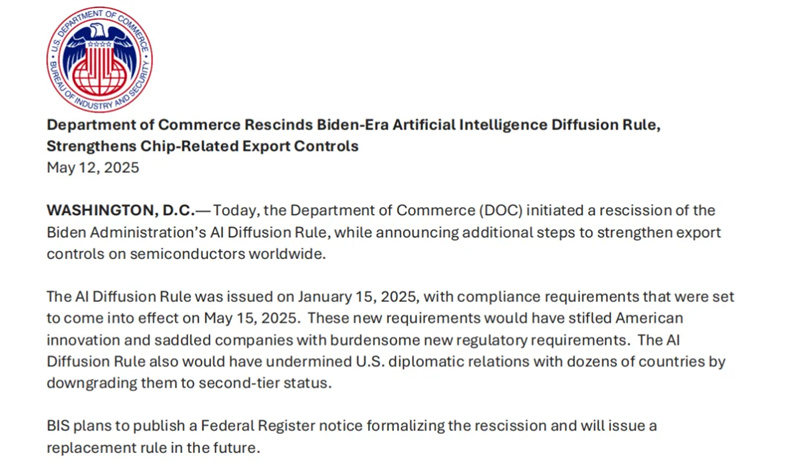In a major policy reversal, the U.S. Department of Commerce on May 13 announced the repeal of the Biden administration's AI Diffusion Rule and unveiled a series of new measures to tighten global controls on advanced semiconductor exports. The move signals a significant shift in U.S. strategy on AI and chip technologies, sending shockwaves across the global tech industry.
Originally set to take effect on May 15, the AI Diffusion Rule—introduced in January 2025—sought to impose tiered AI chip export controls by categorizing countries and regions into three levels. However, the Commerce Department's Bureau of Industry and Security (BIS) said the regulation would have imposed “unreasonable compliance burdens” on U.S. companies, stifled innovation, and damaged diplomatic ties with dozens of nations by downgrading them to “Tier 2” technology partners.
BIS announced it will formally withdraw the rule through a notice in the Federal Register and plans to introduce a revised version in the future. Jeffrey Kessler, the Assistant Secretary of Commerce for Industry and Security, has ordered BIS enforcement officials to cease implementation of the rule.

Kessler criticized the Biden-era policy as “misguided and counterproductive,” arguing it undermined U.S. tech leadership and strained international collaboration. He said the Trump administration will pursue a bold and inclusive AI strategy with “trusted global partners” that protects sensitive technologies while fostering innovation and cooperation.
Alongside the repeal, BIS introduced three new export control measures:
● Global Ban on Huawei Ascend Chips: BIS issued new guidance declaring that the use of Huawei's Ascend AI chips anywhere in the world constitutes a violation of U.S. export regulations, in an effort to halt the global spread of Huawei's AI technologies.
● Restrictions on AI Chips Supporting Chinese Models: U.S. chipmakers face severe penalties if their products are used to train or influence Chinese AI models, reinforcing a tighter blockade on China's AI development.
● Supply Chain Countermeasures: U.S. companies are now required to re-evaluate their supply chain partners, tighten vetting processes, and mitigate technology transfer risks to preserve U.S. dominance in semiconductor innovation.

The Commerce Department said these steps aim to “safeguard America's leadership in AI innovation and secure its global AI advantage.” However, analysts warn that the aggressive unilateral approach risks further fragmenting the global semiconductor supply chain. The new rules could intensify global concerns over tech security, push more countries to pursue domestic R&D, and accelerate efforts to diversify supply chains away from U.S. dependence.
+86 191 9627 2716
+86 181 7379 0595
8:30 a.m. to 5:30 p.m., Monday to Friday
